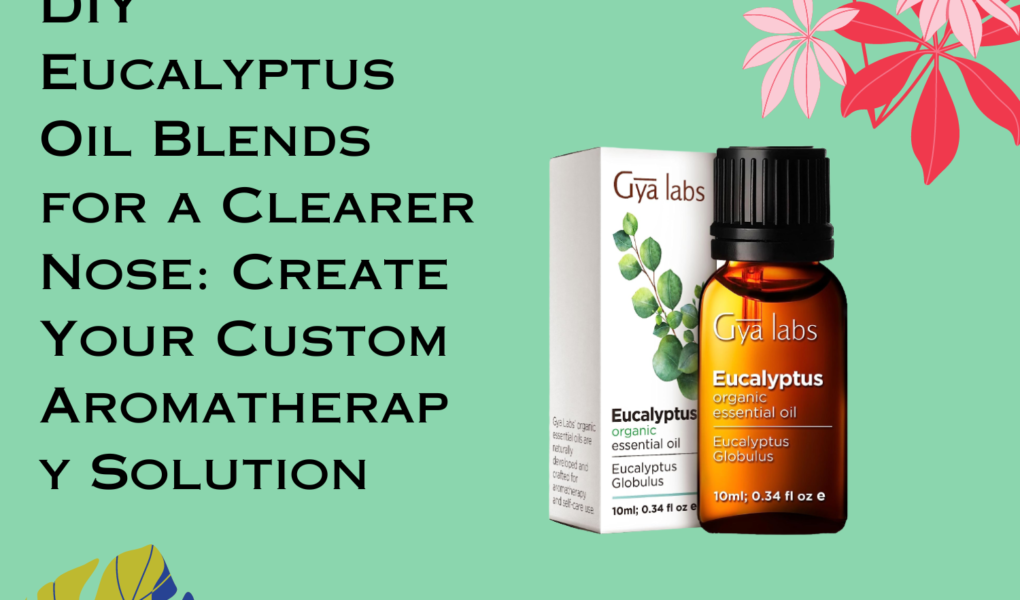When nasal congestion strikes, it can feel like an endless battle against blocked sinuses and restricted breathing. While there are numerous over-the-counter remedies available, many of them come with potential side effects or rely on synthetic ingredients. However, nature has provided us with a powerful ally in the form of eucalyptus oil. Known for its invigorating and decongestant properties, eucalyptus oil can help clear a stuffy nose and promote easier breathing. In this blog, we invite you to explore the world of DIY eucalyptus oil blends, where you can create your custom aromatherapy solutions for a clearer nose.
In this informative guide, we’ll delve into the benefits of eucalyptus oil for stuffy nose, nasal congestion and showcase a variety of DIY eucalyptus oil blends that you can create at home. From steam inhalations to homemade vapor rubs and diffuser blends, we’ll provide you with step-by-step instructions and helpful tips to create your own personalized aromatherapy solutions.
Table of Contents
DIY Recipes with Eucalyptus Oil for Clear Nose Aromatherapy
Recipe#1: Eucalyptus Steam Inhalation:
Ingredients:
- 4 cups of hot water
- 4-6 drops of eucalyptus essential oil
- Few drops of organic lemon oil
- Large bowl
- Towel
Instructions:
- Boil the water and pour it into a large bowl.
- Add 4-6 drops of eucalyptus essential oil & lemon oil to the hot water.
- Lean over the bowl, creating a tent with a towel to trap the steam.
- Close your eyes and inhale deeply, taking slow breaths for about 5-10 minutes.
- Be cautious not to get too close to the hot water to avoid burning yourself.
- Enjoy the soothing and decongesting effects as the steam helps to clear your nasal passages.
Recipe#2: Eucalyptus Vapor Rub:
Ingredients:
- 1/4 cup coconut oil (solid)
- 10 drops eucalyptus essential oil
- 5 drops peppermint essential oil
- 5 drops lavender essential oil
Instructions:
- In a small bowl, add the solid coconut oil and mash it with a fork to soften it.
- Add the eucalyptus, peppermint, and lavender essential oils to the softened coconut oil.
- Mix well until all the ingredients are thoroughly combined.
- Transfer the mixture into a small, airtight container.
- When experiencing nasal congestion, apply a small amount of the vapor rub under your nose or on your chest. Breathe deeply to inhale the aromatic vapors.
Recipe#3: Eucalyptus Diffuser Blend:
Ingredients:
- 5 drops eucalyptus essential oil
- 3 drops lemon essential oil
- 2 drops tea tree essential oil
Instructions:
- Fill your diffuser with water according to its instructions.
- Add the eucalyptus, lemon, and tea tree essential oils to the water in the diffuser.
- Turn on the diffuser and let the soothing blend of aromas disperse into the air.
- Enjoy the refreshing and decongestant effects as you breathe in the therapeutic scents.
Remember, essential oils are highly concentrated, so it’s important to use them in moderation. If you have any underlying health conditions or are pregnant or nursing, consult with a healthcare professional before using eucalyptus oil or any essential oils.
Safety Precautions To Take
While eucalyptus oil can offer various benefits for clear nose aromatherapy, it’s important to take certain safety precautions into consideration. Here are some guidelines to ensure safe usage:
- Dilute Properly: Eucalyptus oil is highly concentrated and can cause skin irritation if used undiluted. Always dilute it with a carrier oil, such as coconut oil or sweet almond oil, before applying it topically. A general guideline is to use a 2-3% dilution, which means adding approximately 10-12 drops of eucalyptus oil per ounce of carrier oil.
- Patch Test: Before using any eucalyptus oil blend on a larger area of your body, perform a patch test. Apply a small amount of the diluted blend to a small patch of skin, such as the inner forearm. Wait 24 hours to check for any adverse reactions like redness, itching, or irritation. If any negative reactions occur, discontinue use.
- Avoid Eye Contact: Eucalyptus oil can cause eye irritation. Avoid applying it near or around the eyes. If accidental contact occurs, flush the eyes with clean water and seek medical attention if necessary.
- Do Not Ingest: Eucalyptus oil is not safe for internal consumption. It can be toxic if swallowed. Keep eucalyptus oil blends away from children and pets to prevent accidental ingestion.
- Consult a Healthcare Professional: If you have any underlying health conditions, are pregnant or nursing, or are taking medications, it’s advisable to consult with a healthcare professional before using eucalyptus oil or any essential oils for aromatherapy.
- Quality Matters: Choose high-quality, pure essential oils from reputable brands. Look for oils that are labeled as “100% pure” or “therapeutic grade” to ensure you’re using a genuine product.
- Follow Usage Guidelines: Adhere to recommended dilution ratios and usage instructions for each eucalyptus oil blend. Different individuals may have varying sensitivities, so it’s essential to start with a conservative amount and observe your body’s response.
By following these safety precautions, you can enjoy the benefits of eucalyptus oil for clear nose aromatherapy while minimizing the risk of adverse reactions. Listen to your body, use eucalyptus oil blends responsibly, and seek professional advice if needed.
Conclusion
In conclusion, eucalyptus oil provides a natural and effective solution for promoting clear nasal passages and supporting respiratory well-being. By creating DIY eucalyptus oil blends, you can personalize your aromatherapy experience and harness the benefits of this powerful essential oil. However, it is crucial to take safety precautions, such as proper dilution, patch testing, and avoiding contact with eyes. Consulting a healthcare professional is advisable for specific health concerns. With responsible usage and adherence to guidelines, eucalyptus oil can be a valuable tool in your quest for clearer breathing and enhanced overall wellness. Breathe deeply, embrace the soothing aromas, and enjoy the revitalizing effects of eucalyptus oil.




